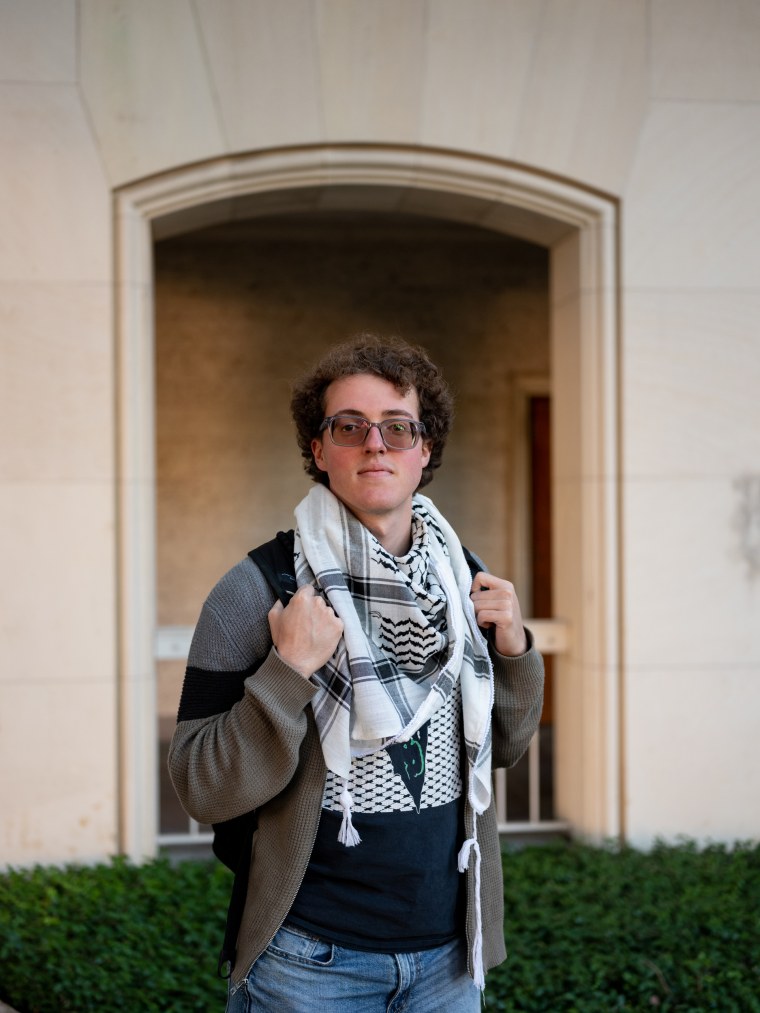The first hint of trouble came via Instagram. On the evening of Oct. 12, a terse message landed in the inbox of the Palestine Solidarity Committee, a student organization at the University of Texas at Austin, shortly before the start of one of its events.
“See you there, you f-----g terrorist,” it read.
The message didn’t faze the student leaders of the Palestine Solidarity Committee, or PSC. They knew their political positions made them a lightning rod on campus, and even more so in the wake of the Hamas attack that killed 1,200 people in Israel, according to government figures.
But about an hour into the event — “Palestine 101, a rundown on Palestinian history, resistance and current context” — three men showed up outside the campus lecture hall where it was taking place.
They got in the faces of the student organizers, and one of the men repeatedly called them “f-----g terrorists,” according to cellphone video of the encounter.
The men said they weren’t there to cause violence. But as more students pulled out their phones, the taunts from the most vocal of the three took a more menacing turn.
“You can also film next week I’m in Israel, we’re killing f-----g Arabs, motherf-----s,” the man said, implying that he was a member of the Israeli army.
Shortly afterward, one of his cohorts boasted that he was a soldier in the Israeli military.
The confrontation lasted more than three minutes. At no point did the men become violent, but the students had to hold the door shut as one of them tried to get into the room.
When the three men finally began to walk away, they threw onto the floor posters they had brought about kidnapped Israeli children. They also confronted students in the hallway who were cramming for a chemistry exam and had no involvement in the event.
“They were looking for a problem,” said Ammer Qaddumi, a Palestinian American member of the Palestine Solidarity Committee in his third year at UT. “But we didn’t engage with them the way they wanted us to.”
The Oct. 7 attack in Israel and its retaliatory strikes in Gaza have spurred a spate of antisemitic and Islamophobic incidents across the U.S. Tensions have run particularly high on college campuses, with acts of hate and violence at places like Cornell, Harvard and Stanford generating national headlines.
But the situation at the University of Texas has drawn comparatively less attention. That, Muslim students and community leaders say, is no surprise.
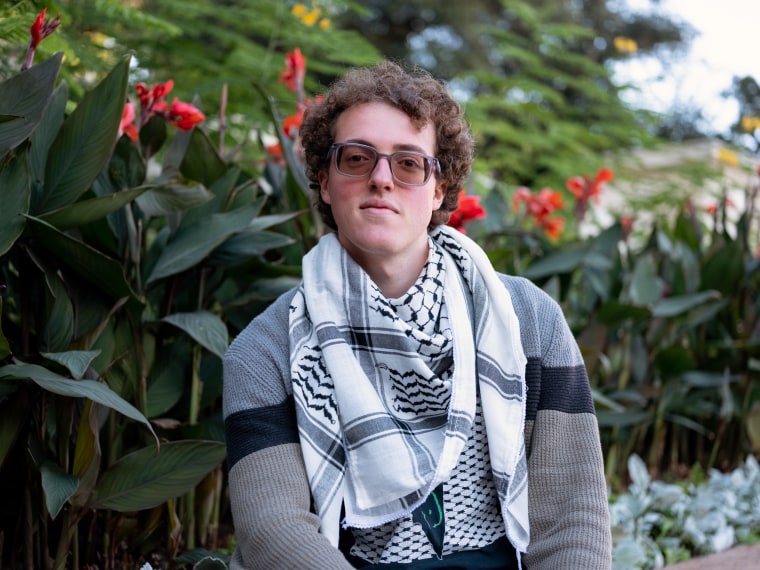
They believe that the incident has laid bare a double standard in how the university responds to acts of hate. The Muslim students and leaders point to the fact that the three provocateurs have faced no repercussions, and the university hasn’t directly addressed the incident in any public statements or forums.
When swastikas were found spray-painted outside a Jewish sorority house in September, the university immediately released a statement condemning the incident and the campus police department increased patrols in the area.
“Palestinian students on this campus, frankly, are seen as a footnote,” said Adam, 21, a senior who is part Palestinian and who asked to be identified only by his first name because of fears of being harassed. “We’re never seen equally to our Jewish counterparts. I think nothing made that more clear than what happened on Oct. 12.”
A UT spokesperson said in a statement that “university administrators have continuously engaged groups and individuals most impacted by the horrific events in the Middle East to ensure their physical and emotional wellbeing.”
“The confrontation that occurred outside of the Palestine Solidarity Committee’s event is not acceptable and upon learning about it, we immediately engaged the UT Police Department to investigate and contacted PSC to offer support,” the statement added.
UT police also released a statement.
“Our preliminary investigation suggests that those engaged were not affiliated with the University and therefore could be subject to a criminal trespass violation,” the department said. “They have not been positively identified and the investigation is ongoing.”
That the investigation is active came as a surprise to the Palestine Solidarity Committee members.
The university previously told NBC affiliate KXAN of Austin that its police department “looked into the matter and found no criminal offense.”
But the students say what is even more baffling is the campus police’s new assertion that they haven’t identified the men. The students said they had no trouble tracking down social media accounts for two of them. The students said they even gave the police the two men’s names and account information.
“I don’t know how much further we can go in doing their work for them,” said the student named Adam. (A university spokesperson said "we have not received any information regarding the subjects' identities from the reporting party.")
NBC News found that the men who disrupted the event, or at least one of them, aren’t difficult to reach.
Last week, NBC News sent a message via Facebook to the man who called the students terrorists. And exactly 20 minutes later, he responded.
A ‘deafening’ silence
The shocking Hamas attack put UT in a difficult spot.
The university has an official policy not to make public statements about “major societal events and matters of general public interest” except when they have a “unique impact” on members of the UT community.
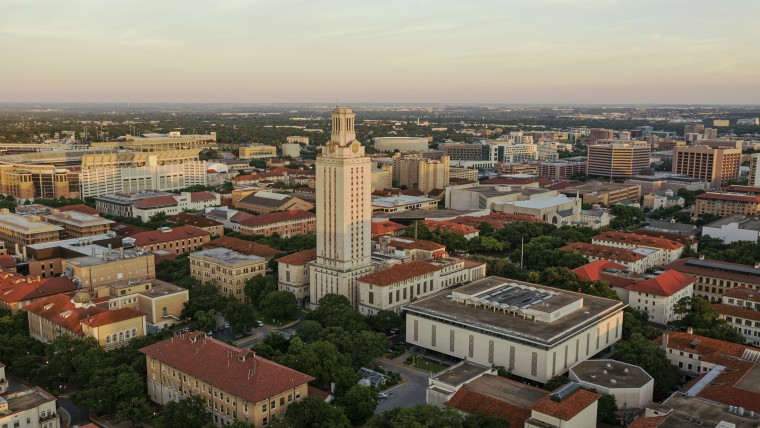
But on the day after the three men berated the students, UT President Jay Hartzell released a statement that was closely read on campus. It referred to the “horrors” of the previous week but didn’t mention Israel, Hamas or Gaza.
Hartzell did, however, note that the university had increased security patrols around “areas of heightened sensitivity, including UT’s Jewish sorority and fraternities, Texas Hillel, and other communities.” Hartzell also said he had shared a message with Texas Hillel’s rabbi.
Anwer Imam, the director of religious affairs at the Nueces Mosque, two blocks from campus, said what stood out to him about the statement was what it didn’t say.
Anything about Palestinian or Muslim students. Anything about the incident at the Palestine Solidarity Committee event the previous day.
“He made sure to mention that he called the local rabbi to lend his support and his condolences,” Imam said. “These are all things that we wish he would offer us.”
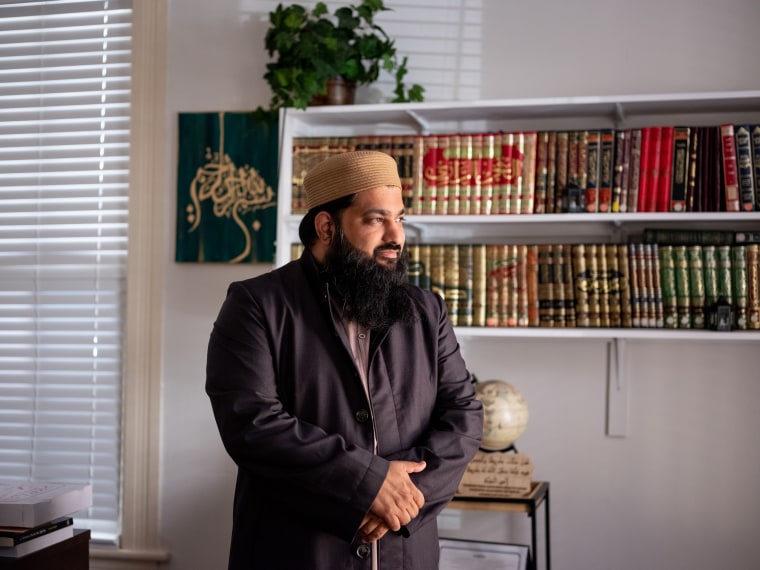
Imam said it was especially striking given the disruption of the Palestinian event the day before.
“The fact that there has not been really any communication from the university, from the leadership, it’s been tough,” Imam said. “The silence has really been deafening.”
Hartzell’s statement also rankled some members of the Jewish community for not going far enough in identifying and condemning Hamas.
Four days later, Hartzell released a second statement, with much stronger language.
Hartzell noted the university’s position of staying mum on current events not connected to the school but said there were costs to that approach, as well — that staying quiet can be seen as an “endorsement of actions that are hard or impossible to defend.”
“Let me be perfectly clear,” the statement added, “the acts of Hamas, including intentional violence toward innocent civilians and calls for the elimination of a people, deserve to be condemned and have absolutely no moral defense.”
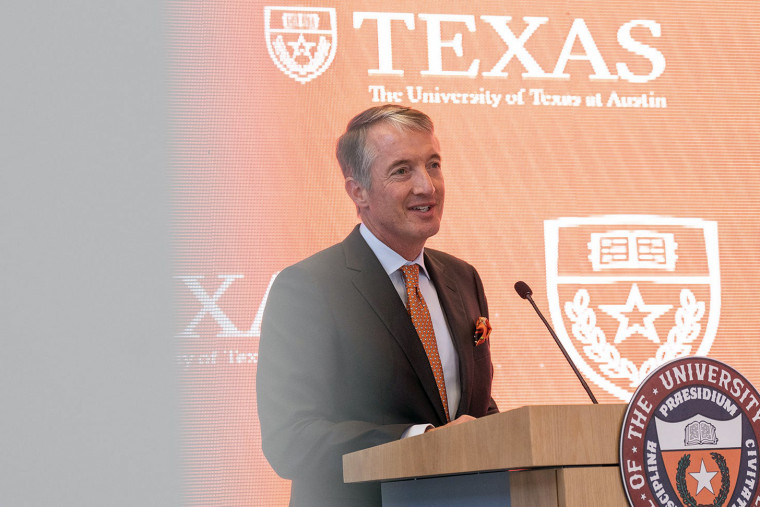
Hartzell also referred to the school’s Palestinian and Muslim communities for the first time.
“I have zero tolerance for the antisemitic actions targeting our Jewish community or the hate-filled actions targeting our Palestinian and Muslim communities,” the statement said.
But it still disappointed Muslim students on campus, as well as others who advocate for the rights of Palestinians. By then, Israeli strikes on Gaza had killed at least 2,775 people and wounded 9,700, according to the Gaza Health Ministry, and nearly two-thirds of those killed were children.
“What does it communicate to our Palestinian students if the administration will not even say the words ‘Palestine’ or ‘Gaza’?” said Sophia Schlesinger, 25, a Jewish UT graduate student who teaches a course on poetry.
"It’s not my intent to minimize the loss and grief of Jewish students on campus," she added. "But I think it’s really hard to read these announcements and not see an asymmetry there."
Jews on edge
UT’s campus, like many others across the country, has also seen acts of antisemitism.
In September, a swastika and antisemitic slurs were spray-painted on the sidewalk outside a Jewish sorority house. The next day, the university released a statement about the incident on its website. “UT condemns these actions and will refer for discipline any University-associated individuals found to have vandalized University or city property,” it read.
Hamas’ surprise assault shook many Jewish students on UT’s campus, as it did Jews across the country and beyond.
A few days after the attack, a UT professor had a friend in Israel speak to students about what he was experiencing.
“When class ended, one of my Jewish students said to me: ‘I just really appreciate you bringing this up. No other professor has,’” recalled the UT instructor, who asked to remain anonymous because of the “rampant antisemitism on college campuses nationwide.”
The professor was stunned.
“If a college is doing its job, it should be providing a safe and brave space for civil discourse,” the professor said.
Jewish students and leaders on campus praised UT’s response to the Oct. 7 attack.
“The university has done a good job in handling this,” said Zander Feinstein, 21, a UT junior who started a campaign last month, Yalla for Israel, to unite college students in supporting Israel. “I’m proud to be a University of Texas student. I have always been very comfortable speaking about Israel here.”
Rabbi Zev Johnson, executive director of the Chabad Jewish Student Center, said he has spoken to many Jewish students who are on edge, but he also gave plaudits to UT’s leadership. He noted that the dean of the university’s business school, Lillian Mills, visited the center on Oct. 13 to provide comfort to students.
“We feel the administration has been an ally and a great partner,” he said.
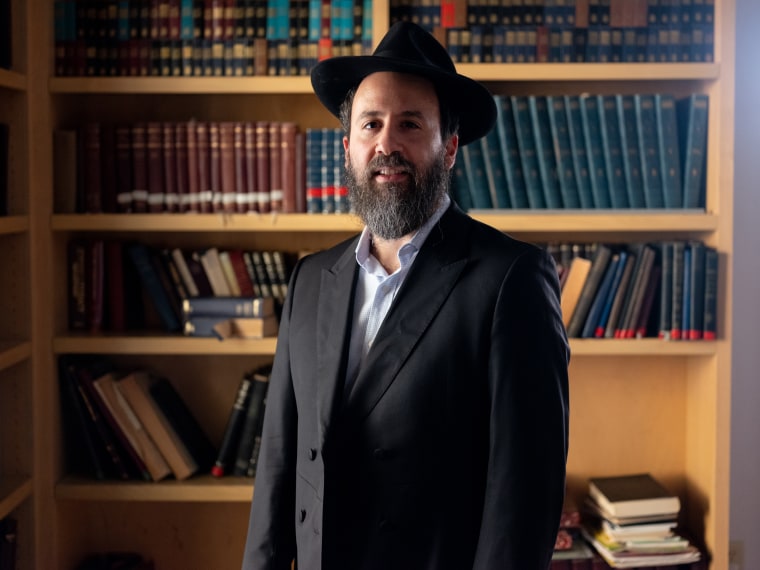
Johnson said that when he saw the video of the men trying to disrupt the Palestine Solidarity Committee event, he was shocked and all but certain they weren’t part of the university’s Jewish community.
“I was just thinking, ‘Who are these people?’” Johnson said.
The students of the Palestine Solidarity Committee had the same question, and it didn’t take long for them to get answers. They were able to quickly identify social media accounts for two of the three men.
One of them, the man who called the students terrorists, appears to be the same person who sent the Instagram message just before the event — his face matches the profile picture on that account.
After NBC News sent the man a message through Facebook, he responded in a message that listed “key facts,” including that it was “an open event,” and he claimed that the group, which promoted the event using the hashtag “from the river to the sea,” supports “Jewish genocide.”
Some people interpret the phrase “from the river to the sea” to mean the eradication of Israel.
Palestine Solidarity Committee members sharply denied supporting Jewish genocide.
"That’s nonsense,” said the student named Adam.
“A lot of people do have this misconception that advocating for Palestinian human rights, advocating for the lifting of the occupation that Israel has placed on the West Bank and Gaza, somehow makes us opposed to Jewish people as a whole,” he added. “It is not true at all. We work with Jewish people. We take a hard-line stance against antisemitism.”
The president responds
After Hartzell released his second statement on Oct. 17, which made no mention of the Islamophobic incident on campus five days earlier, the Palestine Solidarity Committee leaders organized an email campaign to put pressure on the university president.
On Oct. 25, the people who emailed Hartzell received a uniform response.
“We believe that those who engaged were unaffiliated with the University,” it read in part. “As such, they had no lawful right to be in the building or harass our students after their educational meeting. I am disheartened that people would go out of their way to come to our campus and spread their form of hate.”
Qaddumi, one of the Palestine Solidarity Committee organizers, said the incident has only emboldened the group. The students have organized multiple events on campus and in downtown Austin in the last month.
“Their desperate attempt to silence our voice has actually had the ironic effect to amplify our voice,” Qaddumi said. “We see it as our job to continue promoting the cause of the Palestinian people in the face of backlash.”
